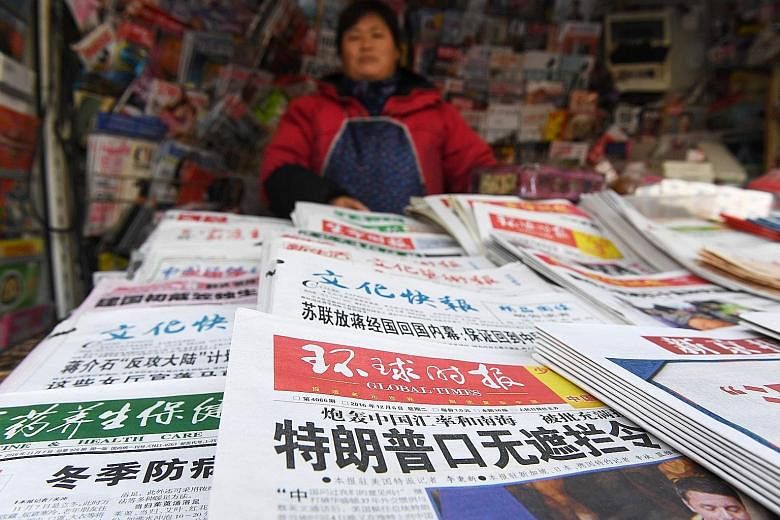TAIPEI/WASHINGTON/BEIJING • Taiwan President Tsai Ing-wen said on Tuesday that her phone call with US President-elect Donald Trump should not be interpreted as a significant shift in US policy, and stressed that both sides see the value of maintaining regional stability.
"The phone call was a way for us to express our respect for the US election as well as congratulate President-elect Trump on his win," she told a small group of US reporters in Taipei.
Mr Trump's phone call with Ms Tsai last Friday broke four decades of diplomatic protocol, alarming some commentators, who feared that it could spark a dangerous confrontation with China.
Others though, especially Republicans, have welcomed it as a sign that Mr Trump will not be bullied by China, and believe the United States should offer more support to Taiwan's island democracy.
Sources in Mr Trump's team said the call was planned weeks in advance to establish the incoming President as a break from the past, although Vice-President-elect Mike Pence described it as a "courtesy" call, not intended to show a shift in US policy on China.
China has reacted with relative calm to the call, lodging what it described as a "solemn protest" with the US government, but also underlining that its economic and diplomatic relationship with Washington depends on the US acceptance of the "one China" principle, which recognises Beijing as the sole representative of the Chinese nation.
But yesterday, it urged the US not to let Ms Tsai transit there when she visits Guatemala next month. Ms Tsai is due to visit the Central American country, one of its small band of diplomatic allies, on Jan 11-12, its Foreign Minister, Mr Carlos Raul Morales, told Reuters.
Beijing blocks Taiwan from taking part in almost all international bodies. Ms Tsai's office said she had told Mr Trump during the phone call that she hoped the US "would continue to support more opportunities for Taiwan to participate in international issues".
Reacting to criticism of the call, Mr Trump pointed out that the US sells billions of dollars worth of arms to Taiwan. He also sent out two tweets on Sunday blasting China for devaluing its currency, taxing US imports and building military installations in the South China Sea.
On Monday, the Obama administration said it had sought to reassure China, which was concerned over the potential fallout from Mr Trump's call.
White House spokesman Josh Earnest said senior National Security Council officials spoke twice with Chinese officials at the weekend to reassure them of Washington's commitment to the "one China" policy and to "reiterate and clarify the continued commitment of the US to our longstanding China policy".
The policy has been in place for 40 years and is focused on promoting and preserving peace and stability in the strait separating China and Taiwan, which is in US interests, Mr Earnest said.
"If the President-elect's team has a different aim, I will leave it to them to describe," he said.
"Some of the progress that we have made in our relationship with China could be undermined by this issue flaring up."
There were also signs of growing concern in Beijing yesterday that Mr Trump's constant criticism of China in his speeches and on Twitter might actually mean something, as Chinese media branded Mr Trump a "diplomatic rookie" and warned that he could pay dearly for his inexperience. "Trump's China-bashing tweet is just a cover for his real intent, which is to treat China as a fat lamb and cut a piece of meat off it," wrote the patriotic Global Times.
"China should brace itself for the possible fluctuations of the Sino-US relationship after Trump is sworn in. We must confront Trump's provocations head-on, and make sure he won't take advantage of China at the beginning of his tenure."
Communist mouthpiece, the People's Daily, was more measured, arguing that dialogue was vital to maintain friendly relations and correct some of Trump's "inaccurate" criticisms of China.
"Provoking friction and messing up China-US relations won't help 'make America great again' ", it said in a front-page opinion piece in its overseas edition.
REUTERS, AGENCE FRANCE-PRESSE, WASHINGTON POST
SEE OPINION
VIDEO
US officials reaffirm "one China" policy. http://str.sg/4Akh

